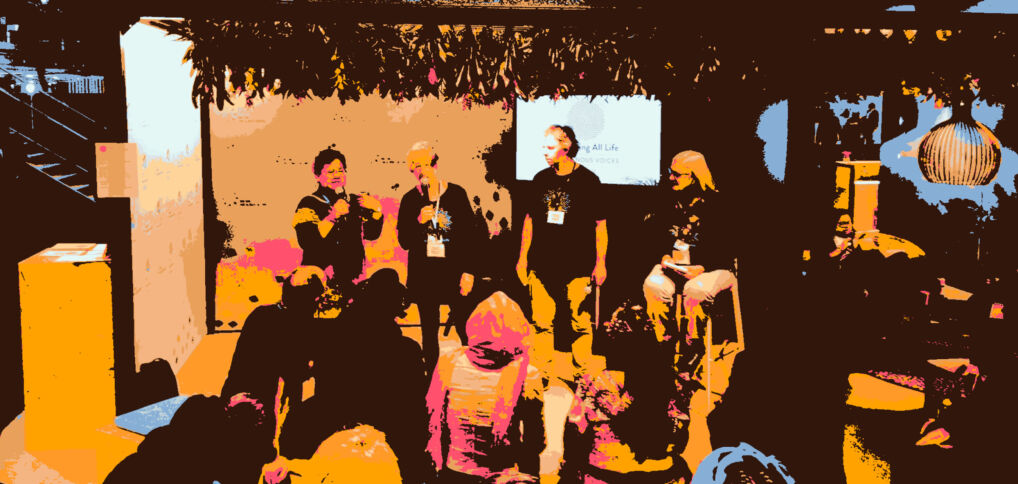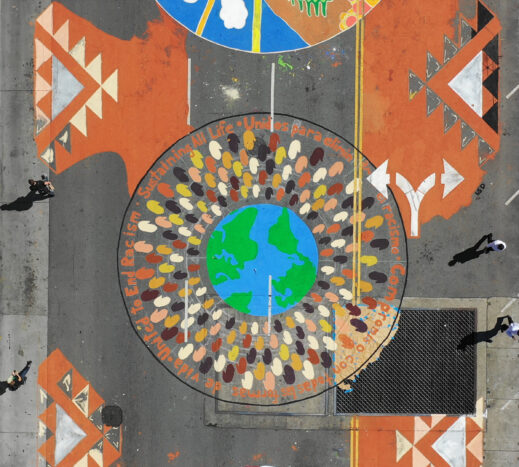
View this resource
as a PDF >>
****
View this resource
in Dutch>>
****
View this resource
in French>>
WE CAN PLAY A KEY ROLE
Decisions and actions taken in the next decade will determine if the planet is livable for thousands of years—even though some of the effects of these actions might not actually be seen for decades or centuries. We can play a key role.
We can limit the increase in global temperature, restore the environment, and reduce further damage—but this means making some big changes right now.
Worldwide, we must immediately and drastically reduce the release of greenhouse gasses, especially CO2 and methane, and other pollutants that cause climate change.
We must eliminate them within a few decades in order to prevent the most catastrophic effects of climate change.
This is a huge challenge—but we already have the technology, resources, and intelligence to do this.
Efforts by government and industry have fallen short. People throughout the world must work together and demand the needed changes. Only an inclusive, powerful, global movement, based on our common interests, can make governments, communities, industries, and others take immediate action to create a just transition to sustainable economies, equitable societies, and a livable planet.
The global climate crisis is one of several damaging consequences of the oppressive and exploitative system in which we live. We cannot solve this crisis without also addressing other phenomena connected to the economic system, such as oppression (including racism, classism, sexism), the exploitation of people and the land, capitalism, and war. This means ending profit as the driving force in our economic system. It also means ending the divisions among people and nations and uniting to solve this crisis. We must find solutions that are in everyone’s interests, solutions that do not harm any group for the benefit of another. Ending oppression and exploitation benefits everyone. We can reduce inequities and create economies and societies that give everyone everywhere a chance for good lives and a livable, flourishing planet.

The nations and people most vulnerable to climate extremes (frontline populations) are those that have been targeted with oppression, exploitation, war, and genocide. Global solutions to climate change depend on leadership by frontline populations, and inclusion of their thinking and perspectives. The broader population also needs to be educated about climate change—its causes, and its possible solutions. We must overcome the effects of decades of misinformation and lies spread by industries and governments. To be successful, we need everyone’s informed thinking and involvement.
KEY ACTIONS
KEY ACTIONS
We can organize for these policy changes to secure a sustainable, safer future:
Energy
- Rapidly and drastically phasing out the extraction (including fracking) and use of fossil fuel and eliminating the financing and subsidies that encourage its use
- Electrifying everything and making renewable, cleanly sourced electricity available to everyone
- Reducing energy consumption to the level of rational need and making all energy use more efficient
- Supporting a planned and coordinated transition to publicly owned, renewable, clean energy and sharing the necessary technical expertise globally
- Decommissioning nuclear reactors only (apart from safety concerns) when they can be replaced with renewable energy, not fossil fuels
Agriculture, other land use, and food
- Adopting climate-friendly techniques for farming, such as growing different types of crops together that don’t hurt people or sacrifice ecosystems and storing carbon in soil and perennial plants, like trees)
- Adopting healthy, sustainable livestock practices.
- In the wealthy countries, reducing the consumption of meat
- Reducing and composting food waste
- Putting strong limits on biofuels
- Protecting and restoring natural carbon sinks, such as oceans, forests, peatlands, and wetlands, with the engagement and leadership of the local people
Resilient, sustainable communities
- Protecting the Earth’s water and using it for sustaining all life
- Making communities climate resilient—by providing everyone, especially frontline and vulnerable populations (people with disabilities, children, elders, homeless and displaced people, and people in institutions), the resources (including affordable housing, health care, education, job training, jobs with good pay and benefits, food, and clean water) they need to adapt to and reduce the impacts of climate change
- Providing support to communities impacted by climate crises so the people can stay in their homelands and not become climate refugees (and where that’s no longer possible, advocating for open borders in the Global North and assisting and welcoming people to settle there)
- Encouraging and supporting lifestyle changes and zero-waste strategies that reduce consumption—primarily in the wealthy countries where consumption is the highest and most wasteful
- Moving to zero- or negative-growth economies in the globally dominant and more industrialized nations
- Creating the conditions for women and girls to have their basic needs met and maintain their health—including by having control over their own bodies and the capacity to reproduce through voluntary family planning, human rights for women and girls, and education and opportunity for girls and young women
- Ending war, supporting universal demilitarization, and using military budgets to fund the transition to a sustainable, renewable, clean energy future
The economy
- Exposing and challenging the myth that endless economic growth is sustainable and in the interest
of all humans - Bringing the financial system and financing decisions into the public sphere, to advance the common good
- Supporting policies and efforts to reverse the concentration of power and wealth
- Encouraging initiatives that democratize wealth and address the well-being of people and the
planet - Adopting ethical and rational means to extract the “minerals” and other resources needed for the
transition to a renewable energy economy, without reproducing the historically unjust dynamics of
global resource exploitation

Transportation, buildings, and other sectors
- Providing access to widespread, affordable public transportation that is powered by renewable clean energy
- Developing alternatives to fossil fuels for commercial shipping and aviation
- Reorganizing our societies so that people live, work, and produce more in their local communities and thus rely less on travel and shipping
- Rapidly reducing greenhouse gas emissions from refrigerants, manufacture of cement, intentional burning of forests, and other high-emission practices
- Modifying existing buildings to be energy efficient and using energy from renewable sources.
Requiring new buildings to be near or net-zero energy - Working for zero waste industrial, construction, and production practices
We need everyone
Both individual and collective actions are needed, from the local to the international level. Individual initiatives one could take include:
- Continue learning about the climate emergency, its effects everywhere (including in frontline communities), and how to take effective action.
- Listening to and communicating with people everywhere about the climate crisis—the causes
and consequences, the larger impacts on low-income and frontline communities, and the solutions. - Joining organizations that are addressing these issues and bring these issues to organizations that you are already a part of.
- Finding your voice and courage to speak out and take bigger and bolder actions than you have ever taken before to challenge this threat to us all.
- Continuing to develop your understanding of and your ability to take action against all oppressions that mistreat and divide people.
- Lowering your personal carbon footprint. There are many online resources for this.
- Creating opportunities to listen and be listened to about worries and fears about the climate
emergency so that we may all think more clearly, act more powerfully, and stay connected as the climate crisis progresses. - Taking time to notice, appreciate, and connect with the beauty and qualities of the natural world that supports us all.
SUPPORT AND HEALING
Everyone understandably has feelings about climate change—grief, fear,anger, despair. Painful emotions, as well as numbness and denial, can limit our ability to face the problem fully. It can also make it more difficult for us to think well.
Rooted in the ways that oppression and other hurtful experiences have damaged us, they can affect our hope for the future as well as our ability to work together on solutions.
When people express negative feelings as they are listened to with care and without judgment, the painful emotions can be released. The feelings become less of a barrier to effective thinking and collaboration. As people talk, cry, tremble, laugh, and express upset, they heal from the hurts of oppression and from feelings of powerlessness, despair, or denial. Supporting people to heal
emotionally in this way will strengthen our efforts to address the climate emergency and enhance our chances of success.
ORGANIZING WIDELY
Collectively, we must work across communities, nations, groups of all kinds. This will require organizing broadly, being inclusive and thoughtful of all people. We must do this as effectively and quickly as we can. Our program can include the below:
- Supporting the sovereignty and leadership of Indigenous nations and Native and tribal peoples
- Supporting the leadership of frontline populations and youth
- Organizing locally, regionally, and nationally
- Building a global movement to end the climate emergency, to rid society of exploitation and oppression, and to create an equitable future for all humans that sustains all life and the planet
- Ensuring that the globally dominant and more industrialized countries provide the resources needed for global solutions to the climate crisis, including technological and financial assistance for local initiatives
- Developing programs for people to transition, collectively and rapidly, off fossil fuels and reduce GHG emissions, including their personal emissions—especially in the globally dominant and more industrialized countries where individual GHG emissions have been the highest


